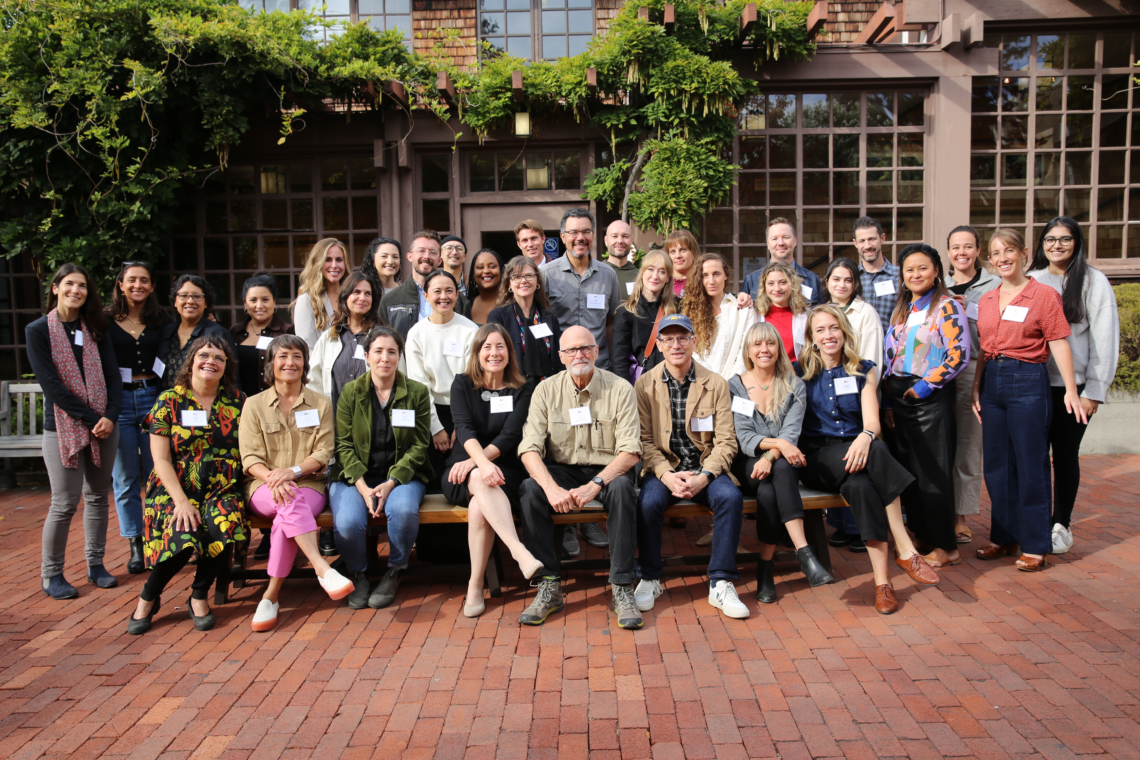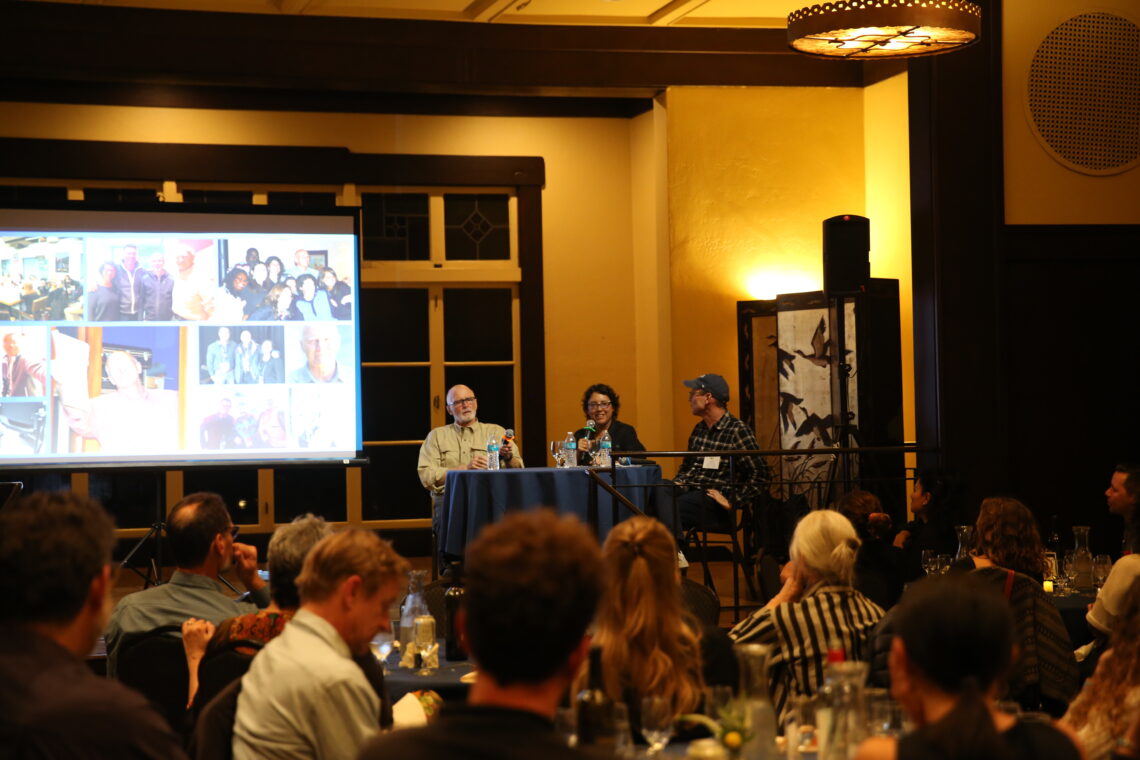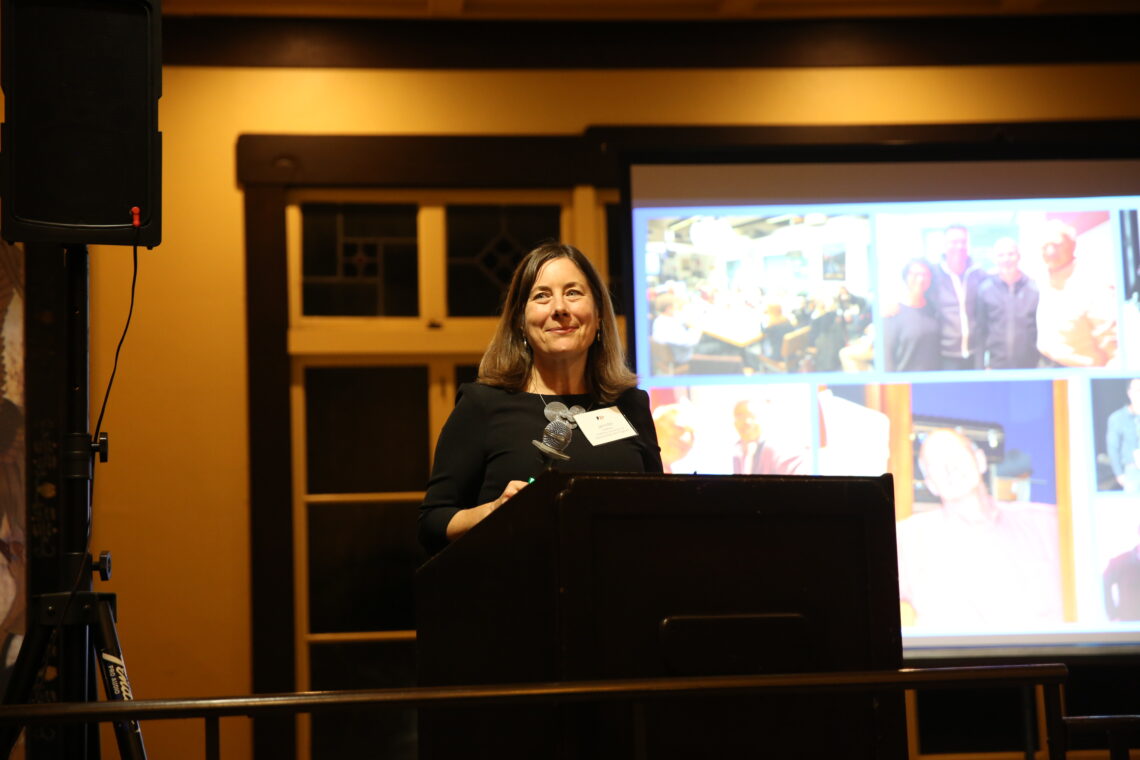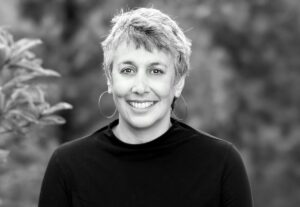
Documentary film alumni gather in the courtyard of North Gate Hall in October 2023. Back row clockwise from left: Lucie Schwartz, Tsanavi Spoonhunter, J.P. Dobrin, Niema Jordan, Cameron Nielsen, Peter Nicks, Mark Oltmanns, Julie Marshall, Charlie Berkowitz, Kathleen Seccombe and Misha Schwarz. Middle row: Lauren Rosenfeld Capps, Clara Mokri, Carrie Lozano, Linnea Edmeier, Katie Bernstein, June Stinson, Luisa Conlon, Maya Craig, Danica Simonet, Maarya Zafar, Marissa Aroy and Maggie Fuller. Front row: Julie Caine, Sachi Cunningham, Clare Major, Jennifer Redfearn, Jon Else, Jason Spingarn-Koff, Wendi Jonassen and Maggie Beidelman. Photo: Andrea Lampros.
More than 80 alums of Berkeley Journalism’s documentary film program gathered in Berkeley on October 21 to connect about documentary filmmaking and celebrate the work of legendary filmmaker Jon Else, offering lively and often funny reflections on memorable teaching moments from their mentor and role model.
“The room was full of anticipation as it came alive with the heartfelt reunion of old friends and colleagues,” Professor Jennifer Redfearn, director of Berkeley Journalism’s documentary film program, said. “Every shared memory was a testament to the impact of Jon’s commitment to nurturing so many gifted filmmakers and fostering the growth of this extraordinary community.”
The daylong event kicked off with a gathering in the North Gate Hall courtyard, followed by presentations from Redfearn, and a panel of current students discussing their doc projects. Professor Jason Spingarn-Koff (‘01), the recently hired Knight Chair of Climate Journalism, talked about the school’s expansive new efforts to cover the global climate crisis.
Else — who has served as a cinematographer on hundreds of documentaries and directed Berkeley Journalism’s doc program between 1997 and 2014 — joked that going to the J-School workshop at North Gate Hall earlier in the day was like “walking into a giant trap.”
“They [J-School staff] were asking students what they did and did not get taught …. and there was a giant list of cascading things of what they did not get taught, and ‘Whose fault was it? I saw that in thousand-point type it said, ‘FUNDRAISING.’”

Carrie Lozano (‘05) and Jason Spingarn-Koff (‘01) pose questions onstage with Jon Else. Photo: Andrea Lampros.
As the audience laughed, Else confirmed that the need to learn how to fundraise for documentary filmmaking and the challenge of raising funds has not abated over time. Else said he has probably received 100 grants over time but has written between a thousand and two thousand proposals.
Alumni shared several maxims from Else’s teaching over the years. Monica Z. Lam, KQED senior producer, said her favorite Else quote is, “Don’t mistake a good time for a good shoot, and don’t mistake a bad time for a bad shoot.”
She asked Else to elaborate. On stage, he explained that some shoots are more fun than others (like ones where you get to eat good food or drink good wine or hang out with a celebrity) but it doesn’t mean that you’re getting what you need in the can. And some shoots are grueling (hot and dusty or cold and wet) but it doesn’t mean the footage that you’re getting is bad. In fact, he said, it might be the best stuff.
Carrie Lozano (‘05), president and CEO of ITVS and former director of the Sundance Institute, and Spingarn-Koff sat onstage to pose questions to Else. “Our question, Jon, for you has it always been this hard and how do you stick to it?” asked Lozano.
“No, it has not. I mean yes, it has,” said Else, to laughter. “Both of the above. I have been at this for 50 years and now is the greatest time ever to be working in documentary.”

Professor Jennifer Redfearn opens the evening at the Bancroft Hotel. Photo: Andrea Lampros.
Else said that one thing that has not changed is the difficulty to fund truly independent films, particularly films about unpopular political ideas. “God bless ITVS. God bless Sundance. God bless the few internationally treasured institutions that still fund these films,” he said.
Else said that the arrival of the cable channels was a “wonderful” thing and that streamers injected much-needed funding (for great docs and “a lot of crap”) for everyone’s benefit.
Spingarn-Koff noted that the business always has ebbs and flows. He asked Else: “What are some of the things that do not change and that you always have to keep in mind?”
“If you talk to 100 different documentary makers, they are all going to have a different answer for that and part of it is philosophical and ethical position on what’s changed and what’s not,” said Else. “My position on that is when the film is over and the lights come on, what the audience believes to be true, has to be true. What the audience believes to be real, has to be real. For me, that has not changed from the day I started making films …. I love when the audience knows what it’s getting. It all goes back to transparency.”
Dean's Newsletter

October 17, 2024
Berkeley Journalism Quarterly Newsletter
Fall 2024 Dear Berkeley Journalism Community, In mid-September, I stepped in as acting dean at UC Berkeley Journalism when Dean Geeta Anand took leave for the semester. While I…

Quarterly Newsletter From Dean Geeta Anand
March 27, 2024

Quarterly Newsletter from Dean Geeta Anand
June 15, 2023
